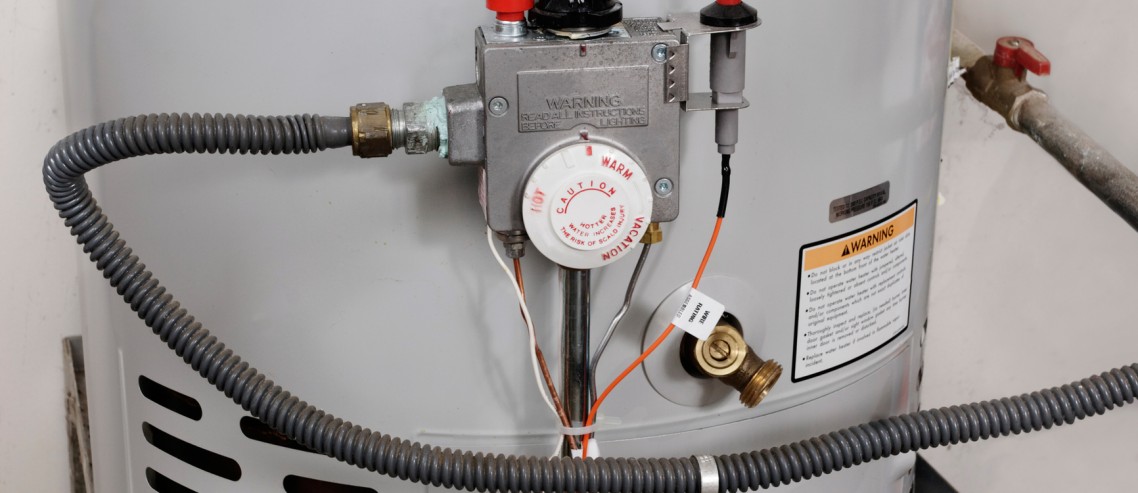Comparing and Contrasting Gas vs. Electric Water Heaters
Nearly every household in America has one of two types of water heaters: gas or electric. The decision of which fuel source to go with ultimately comes down to personal choice and the benefits you seek out of the heater. Assuming you are using the standard storage tank model of water heater, here are some pros and cons of each type of fuel source:
Efficiency and Energy Costs
Efficiency as it relates to appliances refers to how much work the appliance can do with a fuel source. For instance, given 4,500 watts of electricity, an efficiency rating determines how much of that energy goes directly into heating water.
Most electric models have 86 to 95 percent efficiency, which sounds great on paper compared to gas powered water heaters that can range from a high of 85 percent down to 60 percent. Practically speaking, though, electricity generally costs more than gas.
This fact affects typical energy costs of electric water heaters to the point that they are generally more expensive to run long-term. While a 60 percent efficient gas water heater will cost the average family $200-300 a year to run, a more efficient 92 percent water heater will cost nearly double that amount.
In the end, mid-market gas heaters will be the better call in general unless you want to opt for a hybrid electric/heat pump model that can save you up to 65 percent less electricity and around $2,000 to $3,000 over the lifespan of the system compared to a conventional electric system.
Initial Retail Cost
Naturally, you are going to have to buy the water heater unit before you can get it in the door. The added costs of the conventional electric heater’s energy use can be offset by their cheaper price point. Many electric heaters can cost between $300-$500, not including labor, whereas most gas storage tank water heaters cost between $450-$900.
The added costs of purchasing a gas heater will naturally pay for themselves over time for most households, but the price of admission so to speak can be a barrier to many families.
Lifespan and Maintenance
Both types of units are practically equal when it comes to maintenance costs and overall lifespan. Electric water heaters have slightly less complex heating systems, and they also tend to last a year or two longer than gas water heaters, giving them a slight edge in terms of the system’s lifetime costs. These savings amount to a few hundred dollars or less over a system’s 10 to 13 year existence, making a small dent in the gap between electricity’s and gas’ energy costs.
Features
From high efficiency to digital readouts to special heat recapturing techniques, gas and electric water heater models can both run the gamut from extremely simplistic to downright futuristic. Either choice in fuel source will allow you to pick the latest technology if that is the sort of thing that interests you.
No matter how fancy the features, though, the one factor that gas water heaters have over electric is a much faster recovery rate. This rating determines how much water the tank is capable of heating in an hour. Most conventional gas heaters can heat up around 50 gallons an hour, whereas most electric models can only achieve 14-20 gallons an hour. Having that much hot water on demand with a quick turnaround is vital for households that use a lot of hot water throughout the day.
Verdict: Gas Wins
Gas water heaters have obvious advantages over electric versions. Looking at nearly every criteria except for efficiency and initial price, gas trumps electric as the best choice.
Households that only have electric hookups need not fret, though. Electric heaters are cheaper, after all, and they last longer to the point that they can offer greater peace of mind. Yes, the overall cost difference may end up totaling over a $1,000 by the end of the system’s life, but stretching that amount over ten or more years is barely noticeable. Heat pump models also carry the standard for efficiency, often technically surpassing 100 percent efficiency through their use of ambient heat.
In the end, choose gas if you can but do not lose sleep if electric is your only choice. Always enlist the help of a professional plumber or contractor for your water heater installation to ensure that you get the most use and efficiency out of your system. ServiceWhale can provide you with competitive quotes from several Philadelphia area contractors to help you get the advice and expert installation you need. Click here to get started.





Comments
Comments are disabled for this post